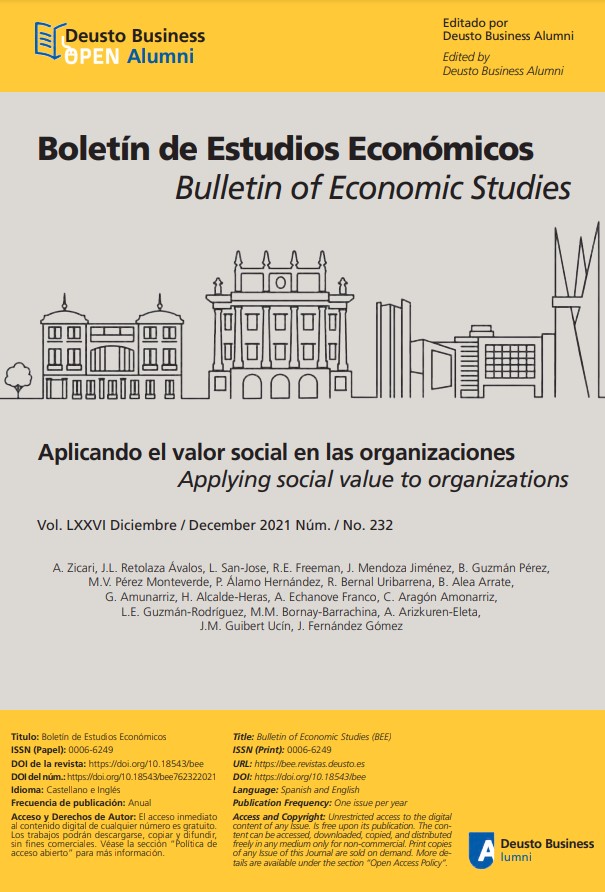Integrated strategic management through social accounting
Abstract
The consensus reached at the global level with the declaration of the 2030 Agenda marked an important milestone in raising awareness of the need for incorporating social value in the development of business activity. It was the reflection of a growing social and institutional demand, a trend that the Covid 19 pandemic has only reinforced and accelerated. In this context, companies have reacted by underlining their concern for the generation of social value, they have strongly retaken the concept of business purpose to communicate the social purpose they pursue and have adapted the reporting systems to the demands of the environment. However, there is still a significant gap between the statement of purpose and the results obtained, two of the key milestones of the strategic management process in the company. At the root of the problem is the lack of social information comparable to economic and financial information, the use of which is inexcusable to formulate and monitor the company’s strategy. The results of this research allow us to propose the polyhedral model of social accounting as a suitable system to enable an effective integration of social value in the company’s strategy.
Received: 27 October 2021
Accepted: 25 January 2022
References
Etxebarria, I.A. (2009). “Las memorias de sostenibilidad: un instrumento Para la gestión de la sostenibilidad”, Revista Española De Financiación Y Contabilidad, 677-697.
Etxezarreta, E., Mendiguren, J.C.P., Diaz, L. & Errasti, A. (2018). “Valor social de las cooperativas sociales: aplicación del modelo poliédrico en la cooperativa para la acogida de menores Zabalduz, S.Coop.”, CIRIEC-España, Revista de Economía Pública, Social y Cooperativa, (93), 155-180, DOI: https://doi.org/1.7203/ciriec-e.93.9953.
Ferguson, C. R., & Dickinson, R. (1982). “Critical success Factors For directors in the eighties”. Business Horizons, 25(3), 14-18.
Fischer, D., Kraten, M., & Paul, J. (2019). “For the Public benefit: why purposedriven companies should adopt, pursue and disclose locally supportive tax strategies”. Atl. Lj, 21, 159.
Francés, A. (2006). “Estrategia y planes para la empresa con el cuadro de mando integral”, Pearson Educación.
Freeman, R. E. (2010). “Strategic management: a stakeholder approach”. Cambridge University Press.
Friedman, M. (1970). “The social responsibility of business is to increase its profits”, The New York Times Magazine.
Gast, A., Illanes, P., Probst, N., Schaninger, B. & Simpson, B. (2020). “Purpose: shifting from why to how”. Mckinsey Quarterly, April 2020.
Gonzalo, J. & Pérez, J. (2017). “Una Propuesta de normalización relativa al valor añadido como medida alternativa de desempeño empresarial”. XIX Congreso Internacional de AECA, Santiago de Compostela.
Hamel, G. & Prahalad, C.K. (1990). “El Propósito estratégico”, Harvard Business School Review, 1, 75-90.
Hazan, E., Smit, S., Woetzel, J. & Cvetanovski, B. (2021). “Getting tangible about intangibles, the future of growth and productivity?” Discussion Paper. Mc Kinsey Global Institute, June 2021.
Johnson, G., Scholes, K. & Whittington, R. (2006). “Dirección estratégica”. 7ª edición. Prentice Hall.
Lazcano, L. & San-Jose, L. (2019). “Monetización del valor social: el caso clade”, Gizarte Ekonomiaren Euskal Aldazkaria/Revista Vasca de Economía Social, 16, 103-127. DOI: https://doi.org/10.1387/Reves.20903.
Mintzberg, H. (1990). “Strategy Formation: schools of thought”, Perspectives on Strategic Management, 105-235.
Retolaza, J.L. & San-Jose, L. (2016). “Contabilidad social para la sostenibilidad. Modelo y aplicación”, Revista de Contabilidad y Dirección. 23, 159-178.
Retolaza, J.L. & San-Jose, L. (2018). “Contabilidad social para el bien común”. Revista Responsabilidad Social de la Empresa, nº 29. 2018. Cuatrimestre II.
Villarreal, O. & Landeta, J. (2010). “El estudio de casos como metodología de investigación científica en dirección y economía de la empresa. Una aplicación a la internacionalización”. Investigaciones Europeas de Dirección y Economía de la Empresa, Vol. 16, nº 3, 31-52. Academia Europea de Dirección y Economía de la Empresa. Vigo.
License:
Works published in this journal are available since 2021 under the Creative Commons Attribution-NonCommercial 4.0 International license - CC BY-NC 4.0. Content prior to 2021 is not covered by the journal's current Open Access policy.
Authors' Rights:
Authors retain copyright over their work published in the Bulletin of Economic Studies and grant the Bulletin of Economic Studies non-exclusive rights to exploit the work for layout, publication, and dissemination purposes. This license allows the Bulletin of Economic Studies to distribute, reproduce, and disseminate the work on its platform and through other media, subject to the conditions outlined in this notice.
Readers' Rights:
Readers may read, download, print, search, share (copy, redistribute, or link to full text), or adapt (remix, transform, and build upon the material) the content, provided that:
- The materials are not used for commercial purposes.
- The original work is properly cited, including the name of the author and the source.
- Any modifications made to the original content are clearly indicated.
Commercial use of the materials is prohibited without the express permission of the authors. For clarity, commercial use is defined as any activity intended for financial gain or involving direct commercial exchange.
Conditions of Use:
The use of content must not infringe the rights of others or be used in a way that could damage the reputation of the author or the Bulletin of Economic Studies.
Responsibility for Content:
Authors are responsible for the content of their papers and the Bulletin of Economic Studies is not responsible for the opinions therein expressed.
More Information:
Open Access, Licensing, and Copyright Policy


.jpg)
.jpg)
.jpg)








